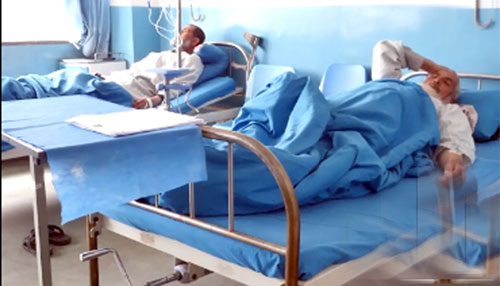The Ministry of Public Health said that the World Health Organization (WHO) and the United Nations Children’s Fund (UNICEF) have provided financial aid to around 70 percent of health centers in 34 provinces of Afghanistan.
“These two organizations fund 2,568 health centers, which support 71% of the health sector,” said Javid Hajir, spokesman for the Ministry of Public Health.
Meanwhile, the European Union (EU) announced the delivery of 34 tons of medical supplies and equipment to Afghanistan.
“Over 34 tons of much needed medical equipment and material were successfully delivered today to Afghanistan. The EU and its partners continue to support the most vulnerable Afghans in the country as long as it is needed,” Janez Lenarčič, the European Commissioner for Crisis Management tweeted.
In the meantime, officials at the Jamhoriat Hospital, the only government-run cancer treatment hospital in Afghanistan, expressed concern over the lack of medical equipment in this hospital.
“We have a lot of problems in terms of staff, lack of space and medical facilities,” said Manouchehr Samadi, head of the cancer treatment department at the Jamhoriat hospital.
Patients in the hospital also complain about the lack of suitable facilities and a lack of medicine.
“We buy medicine from the market, I have been sick for 4 years, but I have been buying medicine from the market for two years, they do not give us medicine here, I have to borrow money to buy medicine from the market,” the patient said.
The aid comes as some international organizations have already expressed concern about the poor state of health care in Afghanistan.
The WHO said vital health services that save the lives of many in the community have come under severe threat. The Sehatmandi program is the backbone of Afghanistan’s health system, providing care for millions of people through 2 331 health facilities, it said. Since the Islamic Emirate gained power, major funding for the program has been withdrawn.
“Today, the population’s health is seriously under threat. All the progress in health outcomes may be lost. WHO is urgently calling for international donors to step up and find an alternative funding mechanism for this crucial primary health care initiative,” WHO said in a report.
Meanwhile, the Ministry of Public Health said it is working to attract more global aid to Afghanistan in the health sector.
“If aid that is provided in the health sector is not distributed in coordination with the Ministry of Public Health, the crisis in the health sector may escalate and people may face many problems,” said Javid Hazhir, spokesman for the Ministry of Public Health.
The WHO’s report comes as a number of Paktia residents are complaining over the lack of health services in the province, and they ask the United Nations to provide them with health services.
“We urge the United Nations to provide medical assistance and equipment to the country’s hospitals,” said Gul Karim, a resident of Paktia.—Tolonews










